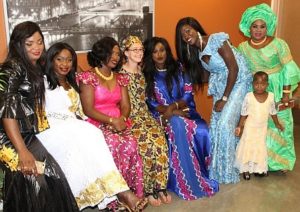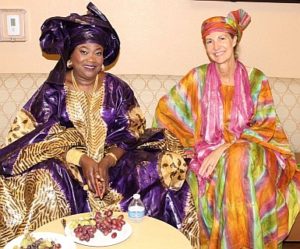Friends, Fashion, and Food!
Every culture has its holidays, and now that our American holiday season is over, I’m reminiscing about the West African holiday I shared with my Senegalese friends. I’ve written before on this blog about Muslim holidays, but this was the first time I celebrated one in California!
Soon after we moved here and began exploring the neighborhood, I spotted a hair-braiding salon with a distinctive name that I recognized as Senegalese. I decided to stop in and say hello, and the women working there were surprised when I greeted them in their native language! The proprietor’s name was Mbaya, and as she wasn’t busy with someone’s hair at the moment, we chatted for a while. I learned that she had lived in the US for around 20 years and had several children, although her husband had recently had to return to Senegal. Since then I’ve stopped by the salon for several short visits.
As the big Muslim holiday drew near, Mbaya invited me to join them for their feast. This holiday, called “Tabaski” in Senegal, is known as Eid al-Adha in Arabic, the Feast of Sacrifice. The story of Abraham and his son is retold, when God provided a ram as a substitute for the life of the beloved and obedient boy. I was excited about joining in the celebration, wondering how the traditions I had seen in West Africa would translate into this urban California context.
My husband, daughter, and I dug our African clothes out of storage and pressed them. We bought a large bag of mangoes at a nearby grocery to bring along as a gift. Mbaya had given me a time to arrive, but I had a feeling that the hour was somewhat arbitrary, and I was right. When we arrived at her apartment at around 4:30 pm, we found her up to her elbows in food preparation, along with a dozen other women jostling one another happily in her small kitchen. She took a break to lead us down the hall to the community room, which she had reserved for the Tabaski party. There, we found a dozen or so other Senegalese immigrants relaxing with drinks, and Mbaya introduced us around. There was traditional music playing, and little girls dancing in one corner. 
The Senegalese were all dressed in traditional holiday clothing, and they were surprised to see us dressed up as well! We chatted with our new friends, most of whom had been in the US long enough to speak good English. They lived and worked in various parts of the city, but an informal network kept them all connected. After an hour or so, Mbaya reappeared, having changed into her holiday outfit. All the women who had been cooking gradually made their way into the party, having finished their work and donned the latest West African style! We hadn’t seen bright colors and fashion like that since leaving Africa, and it was a feast for the eyes! 
More people arrived, and eventually the feast for the stomach came out as well—roast lamb with onions, rice, potatoes, and salad, and we ate our fill. By this time it was late, and while the dancing was yet to come, we took our leave. We felt as though we had been temporarily transported back to Africa, and it seemed surprising to leave the building and find ourselves back on an American city street. I hope to visit Mbaya again, and perhaps get to know some of the other women as well. The soft spot that my heart still holds for Africa is warmed in their presence.
Posted in Uncategorized and tagged holiday by Lisa